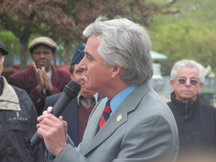Last year, West New York Mayor Silverio “Sal” Vega requested assistance from the state of New Jersey to help the town deal with an $8 million budget deficit that he said had been accumulating for several years.
The decision came on the heels of the passage of last year’s 2008-2009 budget, which like many local towns last year, contained a tax increase. A town accountant said that the budget was up that year largely due to contractual 3.5 to 4 percent raises and debt service.
By agreeing to state supervision a year ago, all of the town’s financial documents were submitted to and reviewed by the state, which then gave advice on how to get the budget in sound order.
“For me, the real heroes were the employees.” – Silverio “Sal” Vega
________
Last week, Vega said the original decision to go under state supervision stemmed from recognition of the pain and worry that taxpayers were undergoing.
“We wanted our taxpayers to know we have nothing to hide,” said Vega.
Vega said that he can relate with newly inaugurated Gov. Chris Christie on some levels because he, too, “inherited a mess.” He added that both situations are a good example that in finance, you can put things off – but the problems just get bigger.
“[You] have to deal with the budget like you would want to in your own life,” said Vega, who criticized the “credit card mentality” that sometimes prevails in government. “Now we pay as we go.”
Cut spending on benefits, payroll
The dissolution of the full $8 million deficit took a multi-faceted approach by city officials.
“For me, the real heroes here were the employees,” said Vega. “They were the first to step up.”
Vega credited negotiations with two of the town’s three unions with saving the future of West New York and also setting the tone for future negotiations with other unions. Vega said that 98 jobs were cut, approximately 25 percent of the work force, about half through layoffs and the rest through attrition.
There are currently approximately 300 municipal workers in West New York, including police and firefighters.
Vega said that despite the reduction in workers, equal services are still being provided due to increased efficiency and use of technology.
Changes have also been made to the work hours for some employees, which reduced overtime pay by half a million dollars.
Additionally, Town Hall workers agreed to a new health insurance plan that is saving taxpayers $200,000 each month, Vega said. Second to salaries, benefits are the largest expense for the town.
Restructuring within the Police Department to eliminate some top supervisory positions also saved money and prevented the layoffs of 23 officers which would have taken manpower off the streets.
At the end of June, the PBA will be negotiating their contract which Vega anticipates may result in further savings.
Vega added that the appointment of a new Municipal Administrator Joseph McConnell, who acts as chief financial officer and budget auditor for the town, helped to bring all of these pieces together.
Next budget will be different
Vega said that town officials were realistic in planning this year’s budget, making cuts themselves prior to the proposal from Gov. Christie’s new administration to cut state aid to municipalities.
The current $70 million budget, which runs from last July 1 through this coming June 30, 2010, was passed at the end of last year. It was reviewed by the state. Vega said it represents a $1 million reduction in town spending. In a few months town officials will be introducing a six-month budget, which will take West New York from July through the end of 2010, in an effort to get the town finances in accordance with the regular calendar year instead of a fiscal year. The state is on a calendar year.
Vega said he hopes the change will help stabilize taxes and assist residents as they budget for the year.
Final numbers on the six-month budget have not yet been made available to the public, but once it is introduced to the state, the public can request copies.
Township officials are also working on a calendar year budget for January 2011 to December 2011.
Political pain
The town’s tax increase last year caused an uprising of residents, led by Dr. Felix Roque and the Together We Can group, who said that Vega and his Board of Commissioners should be recalled.
Last week, the recall committees were in court fighting to put the possible recall of Vega on the ballot. For more on that, see briefs section inside.
If there is no recall, the next municipal election will be held in May of 2011.
A new problem for taxpayers
Vega said last week that what was not anticipated when budgeting for the new year was Christie’s freezing of UEZ funds by the state. The funds come from urban towns’ business districts via sales tax and then go back to the towns to be used for renovations and public safety salaries.
Christie has frozen some of those funds and may discontinue the program.
Vega said that these decisions could put a lot of stress on the town.
“We’ve budgeted well,” said Vega. “But anticipating additional cuts is very difficult. Our goal is to keep things stable.”
Vega did not get specific about whether he anticipates tax increases for residents over the next year, but said that it’s not easy for any municipality to balance the budget without a tax increase.
“One of the reasons we were released is they see we have a solid budget and a solid plan for the future,” he said.
Vega said he is also planning an upcoming tax audit of several waterfront “PILOT” (payment in lieu of taxes) properties. The audit will begin sometime in May and will be an ongoing process that will take six months to a year.
Lana Rose Diaz can be reached at ldiaz@hudsonreporter.com.
